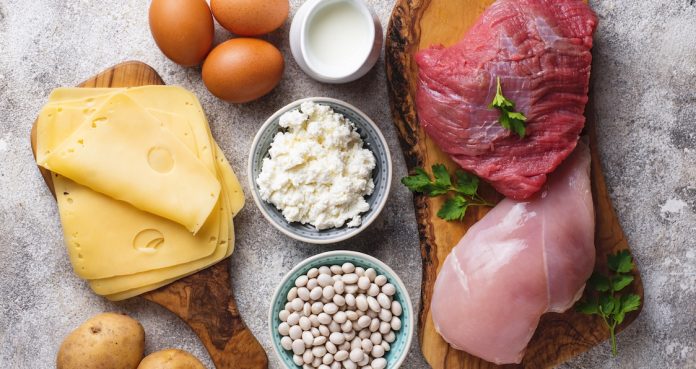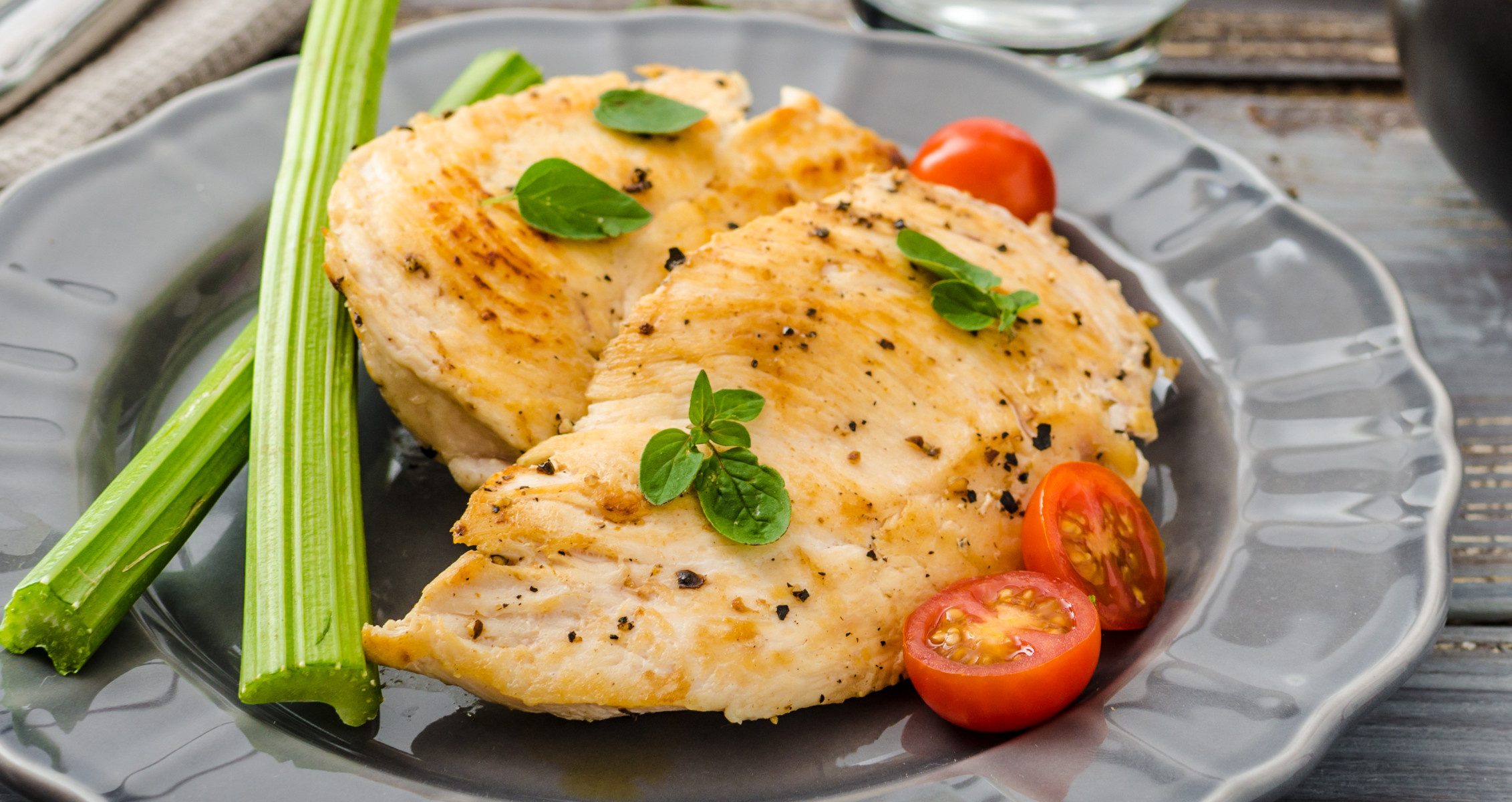Tag: amino acids

How to Eat Clean Like A Professional Bodybuilder
Having a healthy diet is one of the most impactful things you can do for your fitness.
Other than time spent in the gym, a healthy diet is the best way to promote your overall health and muscular conditioning. Supplements can be deceiving and many packaged foods at the supermarket are loaded with artificial colors and ingredients that can make you feel bloated and sluggish.
If you’re looking for inspiration on how to get started with clean, healthy eating that promotes fitness, look no further. Here’s a quick grocery list of 10 foods to help get you started with shopping and eating clean like a professional bodybuilder.
10. Dark Leafy Greens
Dark green vegetables, such as kale, broccoli, collard greens, and spinach, are extremely nutrient-rich and low in calories. They act as a great supplement or base to a heartier plate of chicken or fish. These are probably the best natural source of things like vitamin A, vitamin C, iron, fiber, vitamin K, folic acid, and so many others. It cannot be overstated what an essential source of nutrients these are in your diet.
Recommendation: Keep a bag of kale or a bag of broccoli in the fridge at all times. The kale makes a great base for a salad, while the broccoli works great in a veggie stir fry. Or switch it up based on what you like!
9. Eggs
Eggs are a versatile, protein-rich food that can be incorporated into almost any meal you could think to make — so use them! Eggs are a bodybuilder’s staple for good reason. They pack a huge punch in terms of protein (which allows your body to build muscle) without having too many calories. They’re also a great option if you’re trying to avoid an unhealthy breakfast. Eggs are completely natural — no saturated fats or unhealthy additives to slow you down.
Recommendation: Keep a carton of eggs in the fridge. You can have them for breakfast or add them to a shake for a quick protein boost.
8. Wild-Caught Fish (Salmon, Cod, Tuna)
Fish are an essential source of omega-3 fatty acids and a core component of any pro’s diet. Fish that is caught in the wild tends to have the highest amount of omega-3s, so aim for that if possible. Salmon has a higher fat content than other types of fish and can help you feel fuller for longer, potentially staving off cravings.
Recommendation: Keep salmon, cod, or tuna in the fridge and have once a week. You can bake or pan-sear as an entree, have it over rice, or put it in a salad.
7. Quinoa or Brown Rice
These grains (okay, quinoa isn’t technically a grain) make a great healthy base for a meal. They’re high in amino acids, which are essential for building muscle. If you like both, great, if not, you can easily substitute one for the other. These are also a versatile “building-block” type food like eggs that can easily be combined with other healthy foods for clean, healthy eating.
Recommendation: Keep a bag of quinoa or brown rice in your pantry. You can have chicken or fish over rice or put the rice into a salad with leafy greens — the possibilities are endless.
6. Chicken
Chicken is another bodybuilding essential. It has an astronomical protein-level for something with a comparatively low amount of fat. Again, the key here is to pick foods that can help you avoid the additives, oils, and unhealthy fats associated with processed foods. Cooking your own chicken at home with vegetables, lentils, quinoa, or brown rice is a filling, protein-rich meal.
Recommendation: Keep chicken in your fridge to have for dinner throughout the week. Combine with brown rice, collard greens, quinoa, or broccoli for a healthy dinner.
5. Dry Beans and Peas
Things like black beans, pinto beans, split peas, and lentils are all great additions to a bodybuilder’s diet. They’re easy to combine with a healthy source of protein like fish or chicken to create a meal. They’re also rich in iron and zinc which can increase joint strength.
Recommendation: Keep two bags of your favorite type of beans or peas in the pantry. They make a healthy, filling side in any meal that will keep you from snacking on unhealthier foods.
4. Greek Yogurt
An essential snack food for when you’re in-between meals, Greek yogurt is a healthy and filling option that promotes gut health and the absorption of other nutrients and minerals. Not to mention Greek yogurt is an essential source of protein.
Recommendation: Keep a pack of your favorite Greek yogurt in the fridge for snacking. You can add honey or some walnuts to add flavor and texture.
3. Olive Oil, Avocado Oil (Oils > Butter)
Try to avoid butter, which is high in saturated fats. Opt instead for cooking with olive oil, avocado oil, or another type of cooking oil.
Recommendation: Keep your favorite type of cooking oil in the pantry instead of using butter to reduce saturated fat consumption.
2. Fruits
There are a lot of different categories of fruit, but pretty much all of them are great for you. Apples, bananas, pears, and berries are high in natural sugars but ultimately much better for you than any artificially sweetened snack.
Recommendation: Keep one or two types of your favorite fruits in the kitchen to snack on, use in a salad, or make a smoothie.
1. Whey Protein
Probably the most popular protein additive in the bodybuilding world. Whey protein is clinically proven to increase gains and help the body develop muscle mass faster.
Recommendation: Keep whey protein in the kitchen. You can add it to tea, water, or as part of a healthy smoothie.

Amino Acids Broken Down: An Essential Guide
Amino Acids: Broken Down
So you may have heard of the term ‘amino acids’ bandied about, but what are they, how do they work, do we need them? And if so, why?
Well amino acids are affectionately referred to as the ‘building blocks of life’, and as extreme as that may sound it is actually very true.
What are they?
Amino acids are organic compounds made up of oxygen, hydrogen, carbon and nitrogen. And amino acids are classified into:
Essential Amino Acids, and there are 9 of these, they are: histidine, isoleucine, lysine, methionine, phenylalanine, theonine, tryptophan, and valine (and arginine can be added to the list for younger adults)
Your body cannot produce Essential Amino Acids, so these would come from your diet and the food you consume.
Foods containing Essential Amino Acids:
Meat Eater/ Vegetarian
Plant based options
– Eggs
– Turkey
– Cottage cheese
– Fish
– Red meat
– Chicken
– Milk
– Yogurt
– Seafood
– Tofu
– Quinoa
– Chia seeds
– Legumes
– Beans
– Chickpeas
– Soybeans
– Nuts
– Vegetables
Benefits of Essential Amino acids
Can help with muscle growth
Valine – can help promote muscle growth, and with tissue repair.
Lysine – can help build muscle and aids in recovery.
Leucine – can help with the growth and repair of bone and muscle and with the production of growth hormone.
A 2008 study founds that if ‘EAA supplementation is maintained over time and can improve Lean Body Mass, possibly offsetting the debilitating effects of sarcopenia’ (which refers to the gradual loss of muscle mass).
Can Improve Training Performance
Leucine – can help with the growth and repair of bone and muscle and the production of growth hormone
Isoleucine – this is important for immune function and with energy regulation
Valine – is also involved in energy production
These 3 amino acids are the only ones that have a chain that branches off to one side. And a 2016 study concluded that ‘BCAA supplementation in trained individuals performing resistance training while on a hypocaloric diet can maintain lean mass and preserve skeletal muscle performance while losing fat mass’.
Another study from 2017 concluded that the ‘use of Branched Chain Amino Acids (BCAAs), is better than passive recovery or rest after various forms of exhaustive and damaging exercise. The advantages relate to a reduction in muscle soreness and ameliorated muscle function because of an attenuation of muscle strength and muscle power loss after exercise’.
This is why BCAA supplementation are so popular to gym goers everywhere.
And for anyone new to the gym, one study actually proved that taking ‘4 g/d of L-leucine supplementation may be used as a nutritional supplement to enhance strength performance during a 12-week resistance training program of initially untrained male participants’.
Can help Improve your Sleep
Tryptophan – is a precursor of melatonin and serotonin, which help regulate sleep.
And low levels of Tryptophan have been linked to depression and also anxiety, with one study from 2000 concluded that ‘the panic-enhancing effect of tryptophan depletion as well as the potential protective effect of tryptophan administration in panic disorder patients can be explained by the Deakin-Graeff theory of anxiety.’
So how much Essential Amino Acids do I need?
The United States Recommended Daily Allowance (RDA) for adults can be seen in the table below:
Adults RDA: 19 and older
RDA per day
Histidine
Isoleucine
Leucine
Lysine
Methionine and Cysteine
Phenylalanine + Tyrosine
Threonine
Tryptophan
Valine
14 mg
19 mg
42 mg
38 mg
19 mg
33 mg
20 mg
5 mg
24 mg
Nonessential Amino Acids, are amino acids that our bodies produce, and are mainly synthesized from glucose.(or synthesized by the body from the food you eat)
Nonessential amino acids include: alanine, arginine, aspartic acid, cysteine, glutamic acid, glutamine, glycine, proline, serine, and tyrosine.
Benefits:
Arginine – is a precursor to Nitric Oxide so plays a vital role in the dilation of blood vessels (which is why arginine is popular as a supplement)
Glutamine – beneficial for recovery, healing and is a major nitrogen transporter and is beneficial for a healthy nitrogen balance
Tyrosine – is critical in allowing for the regular function of the thyroid gland and important in the production of dopamine and helps regulate mood.
Conditional Amino Acids, are made by the body and are generally considered nonessential unless you become ill or stress induced, if this happens then the body will require a higher level of conditional amino acids and this will have to be obtained via your diet.
Conditional amino acids are arginine, cysteine, glutamine, tyrosine, glycine, ornithine, proline and serine.
Benefits:
Serine – helps support cognitive function
Proline – is essential for the synthesis of collagen
Glycine – helps with the maintenance of sleep, and also promotes glycogen storage
So now you know about your Essential Amino Acids (EAA’s) and Branched Chain Amino Acids (BCAA’s), and yes we need them in our lives. Be ensured to eat a balanced diet to obtain all your essential amino acid needs, and supplement accordingly when your body is feeling weak from illness, fatigued or stressed, as amino acids can help keep us healthy, make us stronger and can give us all the tools we need to make every repetition count to ensure we can all become our optimum selves.
References:
https://academic.oup.com/jn/article/132/12/3744/4712135
https://pubchem.ncbi.nlm.nih.gov/compound/L-valine
https://pubchem.ncbi.nlm.nih.gov/compound/L-lysine
https://pubmed.ncbi.nlm.nih.gov/19419806/
https://pubmed.ncbi.nlm.nih.gov/19208731/
https://pubmed.ncbi.nlm.nih.gov/26733764/
https://pubmed.ncbi.nlm.nih.gov/28177706/
https://pubmed.ncbi.nlm.nih.gov/28870476/
https://pubmed.ncbi.nlm.nih.gov/21487148/
https://www.cambridge.org/core/journals/british-journal-of-nutrition/article/chronic-treatment-with-a-tryptophanrich-protein-hydrolysate-improves-emotional-processing-mental-energy-levels-and-reaction-time-in-middleaged-women/AB54DC8C47AF5C589B87EDD30B382386
https://pubmed.ncbi.nlm.nih.gov/26805875/
https://pubmed.ncbi.nlm.nih.gov/18648776/
https://www.ncbi.nlm.nih.gov/pmc/articles/PMC4523676/
https://www.sciencedirect.com/science/article/abs/pii/0165032789900517
https://pubmed.ncbi.nlm.nih.gov/9707299/
https://pubmed.ncbi.nlm.nih.gov/10760376/
https://www.nap.edu/read/10490/chapter/12#615
https://globalrph.com/rda-and-ear-recommendations-for-essential-amino-acids/
